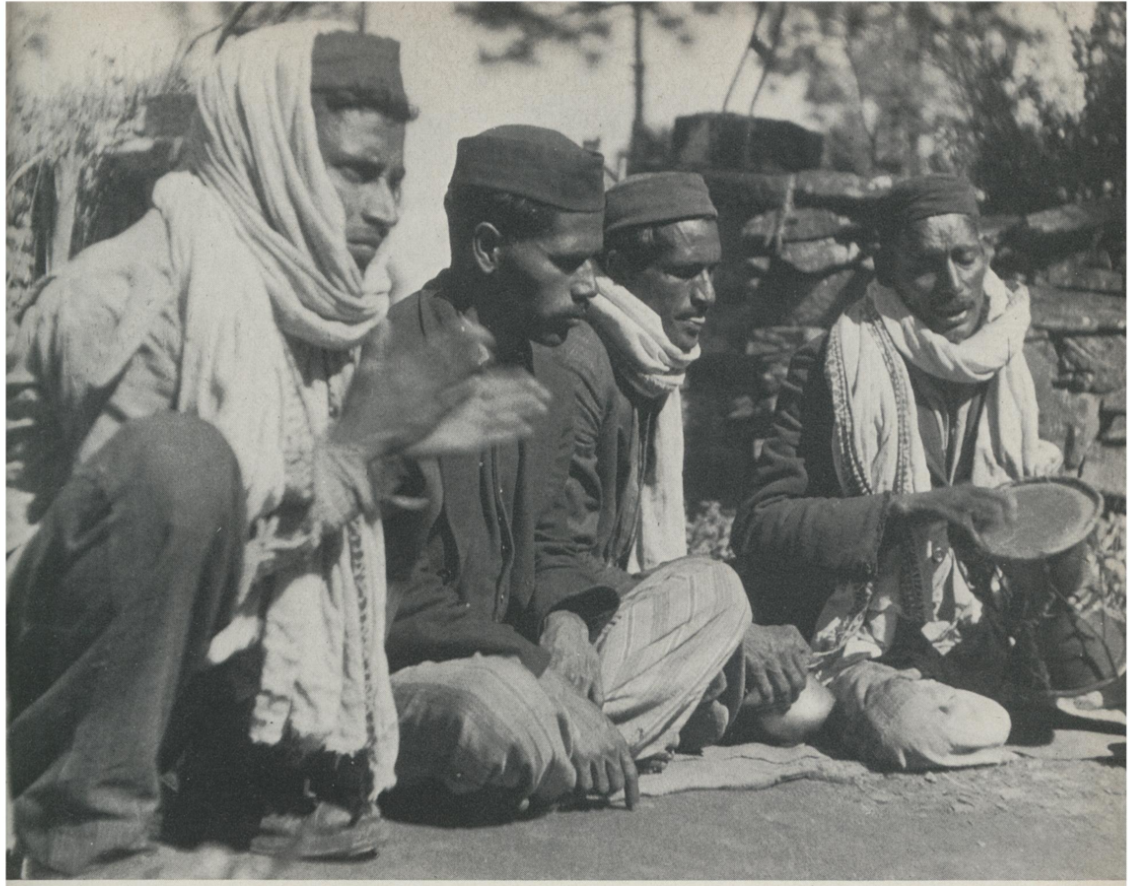In 1898 Pandit Ganga Dutt Upreti published a book on the popular proverbs of Uttarakhand titled “Proverbs & folklore of Kumaun and Garhwal“. He was the first person from the Himalayas to write such a collection. British officials such as E. T. Atkinson, and G.W. Traill, referred to this book in their writings.
Gender & Caste:
Lower castes and women are the two most discriminated social categories in Indian culture since ancient times. Often their subjectivity is compared with each other.
1. नाज़ कुनाज़ ड़ुमन मोटी (The bad grain, fat woman and strong Dumani are of no use). A Dumani is a lower-caste woman whose traditional works have been related to leather and dead animals. The male members of the community are called Duma (Dom). They are also known as Chamar/Bhangi etc in other parts of India.
2. और न देंद हाको डाको आप रांडन हुड़किया राखो (A female who lectures others on chastity is herself in love with a drummer). Hurhakiya is a male member of the community who has traditionally been a drummer. They are a sub-caste of the Duma community.
3. धेला कि डूमनि टकाको मिज़ाज (A Dumani worth nothing has the pride of worth). Female members of the Duma (Dom) community are considered worth nothing because they hardly do anything for the upper caste, especially in hills. These female members work as landless agriculture labour in the Ganga plains of North India but almost nothing in the hills.
4. खसम बोलिक डूम पर हाथ (A caste woman lays her hand upon a Duma ). This proves is applied to one who thoughtlessly does something wrong.
5. मागाल सहेव गोत्र गाल निसहेव (One can tolerate the slandering of this mother but not that of his caste). Respect for his/her own caste is considered more important than respect for the mother.
6. मुख लगै ड़ुमणि ल्या गुस्याणि लूण (if you are kind to a Dumani (low caste woman) she will take the opportunity to ask for salt). This proverb suggests not giving enough space to the lower caste women while talking to them.
Himalaya & Untouchability:
2. आपणो खाणु खाणो डूम थें छुवे मांगणो (The food of a higher caste is considered defiled and only fit to be throwaway if it is touched by Duma).
3. डूमकी तौली बोद कि बिठाणा कबारि जौं (The Duma’s vessels says, “when shall I go to the dwellings of the Bithas?”) (A Dum is always anxious to mix with the Bithas (Patricians). Even an injury done by a Bitha to a Dum is welcomed by him so long as it also disgraces the Bitha caste).
4. डूम दगड़ि गूगेलि (A quarrel with a low caste man is like playing with human excreta)
5. डूम (A Lower Caste) की डुम्याण बोक्या कि बोक्याण कखि नीजांदी (The peculiar smell of a Dum and a he-goat never dies out).
6. भाट का बाडया भीतनाई लींड गाढ़या (If a Bhat (a caste of Khassia Brahmans who beg for any and every one by singing their praises and will even take money out of a dead man) income increases they ease themselves inside their houses).
Right to Life:
1. भलदा मरिगयो भली भै डूम कुड़ि लागो भली भै (the bear was killed, that was a good thing, but that the house of the Duma was burned down was also a good thing). (This saying originated from the story of a bear who once entered the house of a Duma after honey in a hive, and accidentally set fire to the house by stirring up the cinders. So, according to the higher castes (Bithas) of Gangoli, “two birds were killed by one stone.”)
2. बीठ (उच्च जाति) को निछनू डूमको मरणु के निजाणनु (Bithas are always supposed to be wealthy, and
Doms are a low and disregarded class, whose death is a matter of no concern)
3. डूम को ब्या आंखनडा (The marriage of Dum pains the eyes).
Read This Too: (Proverbs & Folklore of Kumaun And Garhwal)
Caste & Honesty:
1. डूम ग्वेर बाग बखर वालो (To make a Dum cowherd, and a leopard a shepherd) (Dums will eat beef, and so cannot be trusted with the care of cows).
2. डूम हलन मल खांदि दांव जल (Duma will neither plough nor manure the field but at dinner time is envious).
3. डूम त्वे मैराखुलो चोरी जारी नाकरी (O, Duma I shall keep you if you do not commit theft and adultery)
4. सबन है ठगनाई (A barber is the greatest cheat of all)
5. चोरो को माल चंडाल ख़ौ पाप को माल प्राचिता जौ (stolen property is enjoyed only by low caste but property obtained by sin has to be spent in atoning for the crime).
6. भीं न भाना डूमका हाना (This is made use of to represent a very haughty person who has no more reason to be proud than a Duma has. A haughty version is represented by a Duma).
Caste & Food:
1. भात खादुक जात पुछद (After having eaten rice from a man’s hand to enquire about his caste). It is believed that after eating rice (not other kinds of food) from a man’s hand you can refuse him nothing, no matter which caste he belongs to. Even today the rice is cooked by only Brahmin in any community dinner including marriage etc.
2. बिगच्युं डूमख़िरिमा लूण (A very proud Duma who goes beyond the limits of his caste puts salt in the rice milk, instead of sugar).
3. जातन मे बाडिया सागन मेजडिया (Of all castes the Barhiya (gardener) is the worst and of all vegetables the Jarhiya (Roxburgh).
4. डूम हलन मल खांदि दांव जल (Duma will neither plough nor manure the field but at dinner time is envious).
5. ख़सिया नै जाड़ो बामाण खै जाड़ो (A Khasiya (low caste) feels cold after bathing and a
Brahman after dinner).
Others:
There are many other proverbs which revel the prejudices against the lower caste in the hills of Uttarakhand.
1. काला कालों कि एक जात (Applicable to the union of wicked persons)
2. गना डूमको (A Lower Caste) गाइयो नि गाइयो (The singing of a Duma with goitre is no singing at all)
3. पाँच लाइ निखोणी डूमन दसलाइ निखोणी बीठन (A Dum ought not to quarrel for the sake of five rupees and a Bitha (patrician) for ten rupees). in agriculture, house building etc)
He also gave some of his collection to Reverend E. A. Oakley who along with Tara Dutt Gairola collectively published another book titled “Himalayan Folklore” (1935) which includes folklore from Uttarakhand and Nepal. There are some other books that also collect proverbs and folklore and dialects of Uttarakhand. This includes “Hill Dialects of the Kumaun” by Ganga Dutt Upreti,

Hunt The Haunted के Facebook पेज से जुड़ने के लिए यहाँ क्लिक करें (लिंक)


